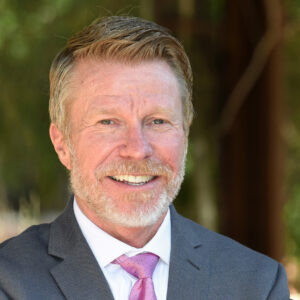Kurt Paterson, Ph.D.
Director and Professor, Polytechnic School, Ira A. Fulton Schools of Engineering / Arizona State University
Kurt Paterson is Director and Professor of The Polytechnic School in the Ira A. Fulton Schools of Engineering at Arizona State University. With more than 7,600 students and 40 degree programs on campus and online, The Polytechnic School (TPS) is one of the largest and most comprehensive engineering and technology schools in the United States.
Dr. Paterson was appointed Director for The Polytechnic School at the beginning of 2023. As Director, he oversees 225 faculty and 65 staff across degree and research programs in engineering, information technology, aviation, human systems engineering, technology entrepreneurship and management, graphic information technology, environmental resource and management, user experience, and engineering education systems and design. New programs launching include undergraduate and graduate degrees in clean energy systems, a doctorate in information technology, and baccalaureate in user experience. Dr. Paterson leads the advancement of TPS, focusing its academic and research programs on inclusive transformation of the world through principled innovation. Central to the student experience is the “Fulton Difference” – opportunities beyond the classroom that include signature undergraduate and graduate research, peer mentoring, entrepreneurship, student organizations, internships, and community service — and a polytechnic heritage focused on project-rich partnerships with industry.
With an established record in academic leadership and administration, Dr. Paterson is working with the faculty and students to increase the impact of TPS. This includes driving educational innovation to deliver high-quality engineering and technology programs online for degree delivery to students and workforce development to industry. Additionally, he is rapidly recruiting outstanding faculty in key focus areas of clean energy, AI teaming, and modern education systems, while scaling the TPS research enterprise to create a public-private innovation engine for one of the nation’s fastest growing regions. A new 200,000 square foot building is opening in Summer 2025 to help stimulate this initiative. Long known for their innovative teaching, TPS faculty and students are engaged in research that resulted in $16.5M of external funding last year.
Prior to joining ASU, Dr. Paterson served as a Senior Sustainability Advisor to the U.S. Department of State. There he launched a global assessment of greenhouse gas emissions for the Department’s operations to drive decarbonization decision-making. Previously he served as Head of Engineering at James Madison University for eight years where he oversaw the buildout of this new engineering program through faculty, facilities, and partnership development. He was on the Civil and Environmental Engineering faculty at Michigan Technological University for nineteen years, leading numerous international development engineering programs integrating community partnerships and field scale research in more than 40 countries. Following the completion of his doctorate degree, he was a visiting scholar at NASA Goddard Space Flight Center’s Laboratory for Atmospheres. His research interests focus on the intersection of air pollution and environmental health with studies across spatial scales, global through indoor. He has been engaged in numerous small-scale infrastructure projects in developing economies, mainly related to potable water, sanitation, and energy. He has also been involved in numerous sponsored projects related to higher education excellence through leadership and institutional innovation.
Dr. Paterson has a thirty-year track record of service, holding numerous leadership positions in the Kern Entrepreneurial Engineering Network (KEEN), Engineers Without Borders-USA (EWB-USA), and American Society for Engineering Education (ASEE), among others, and is the recipient of numerous service awards. He is a Jefferson Science Fellow of the National Academies of Sciences, Engineering, and Medicine. A first-generation college student, he received his baccalaureate in mechanical engineering, masters in environmental engineering, and doctorate in civil and environmental engineering from the University of Iowa.
